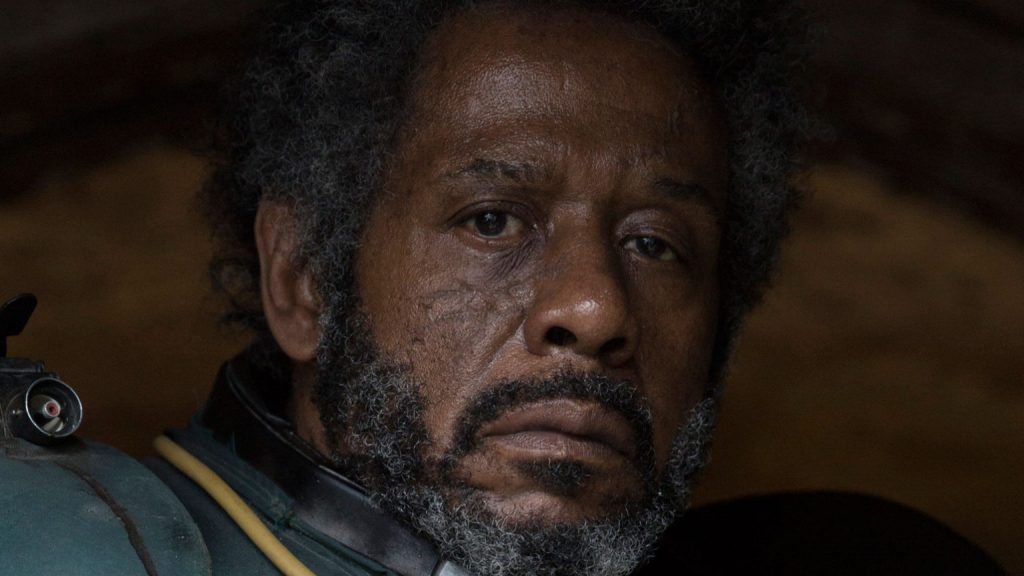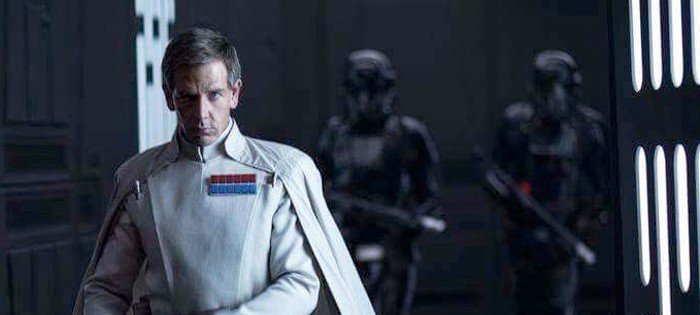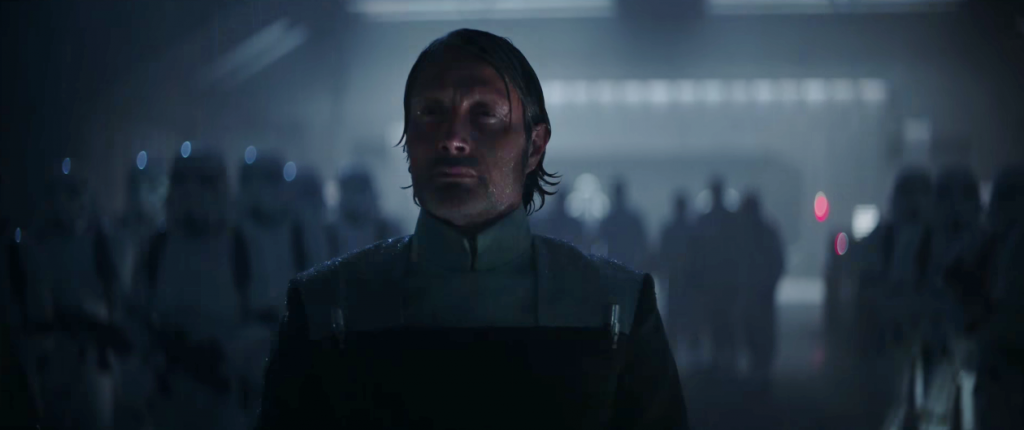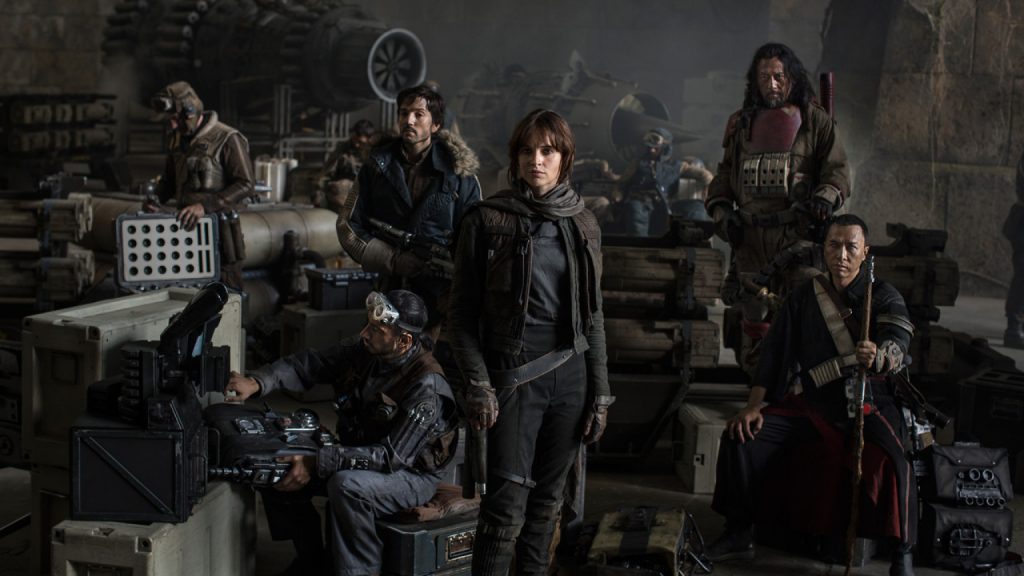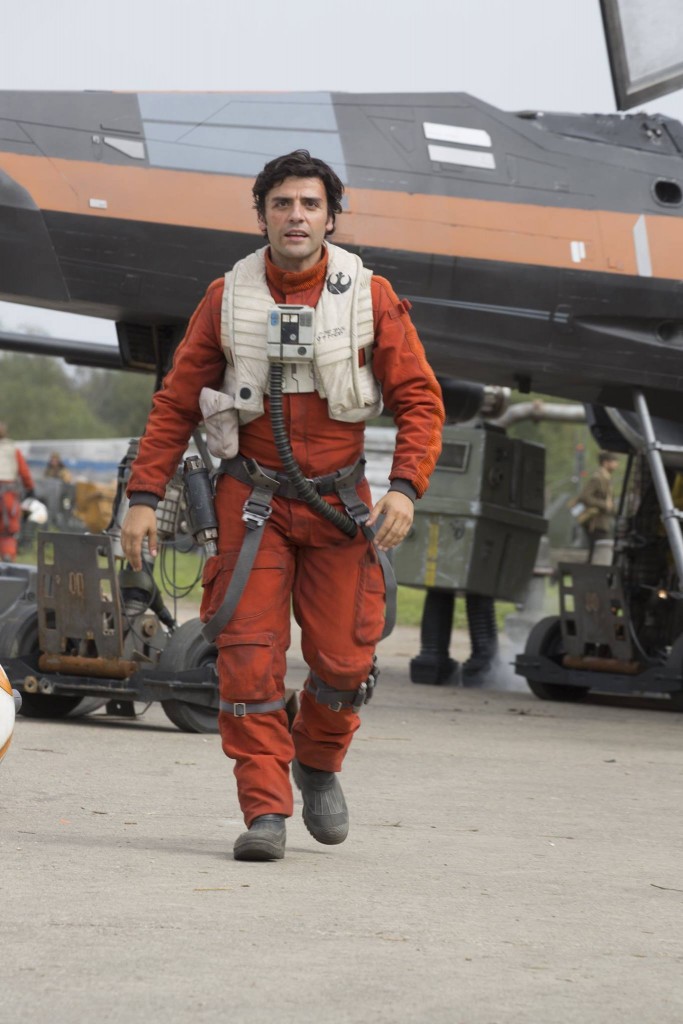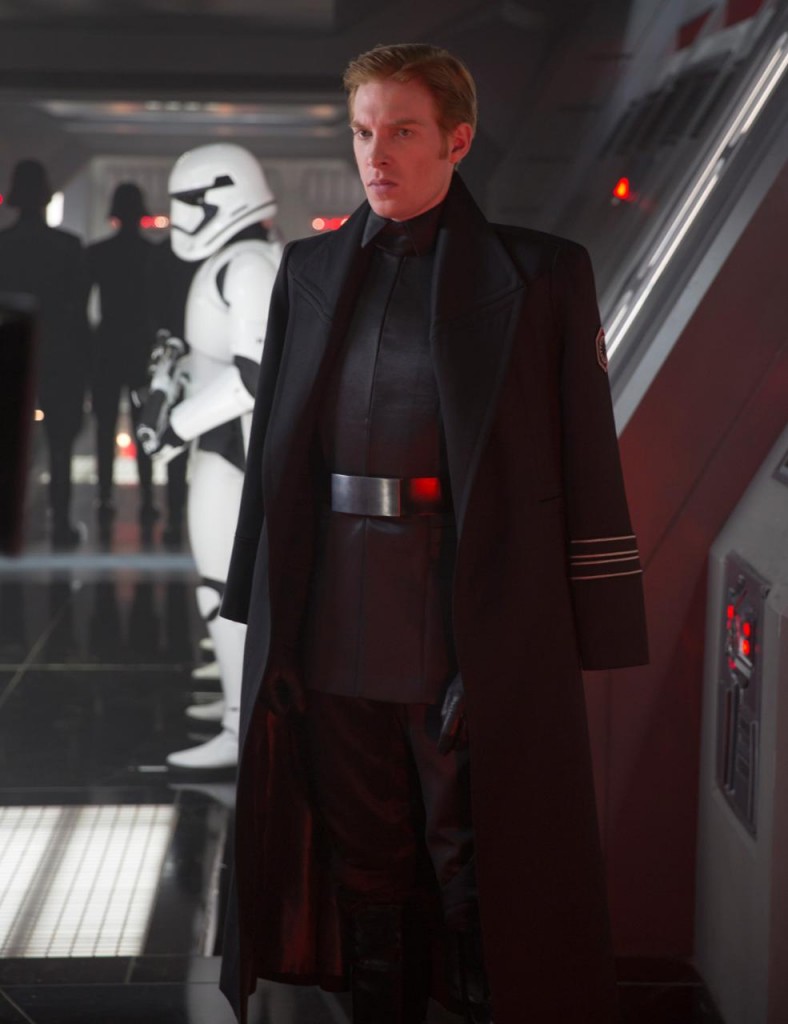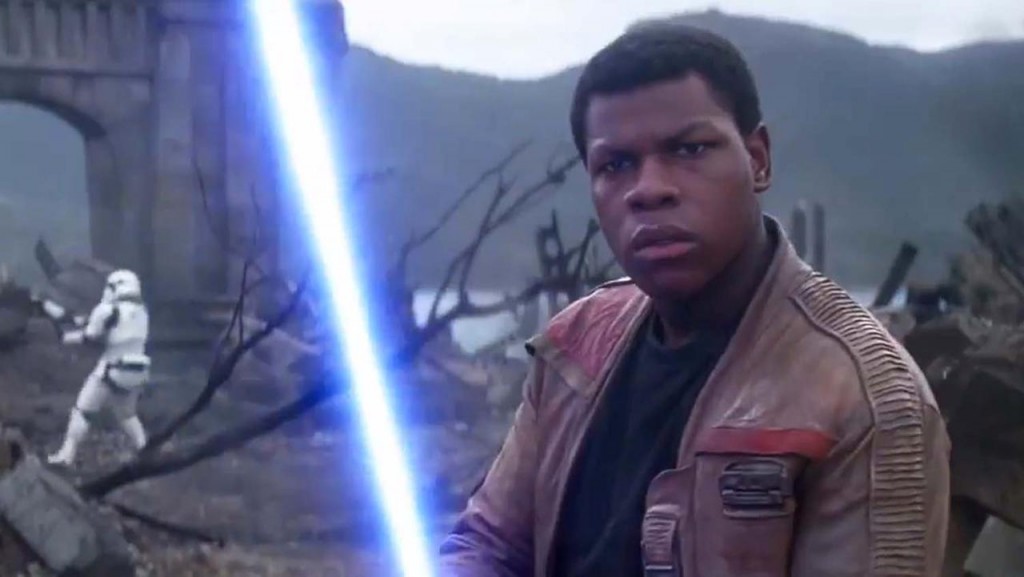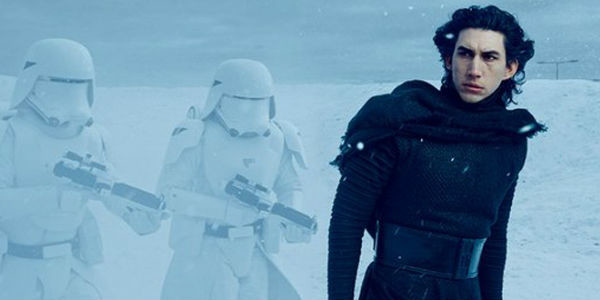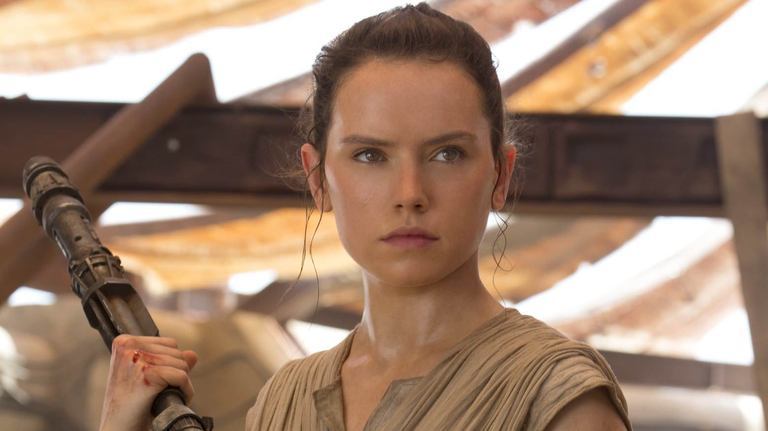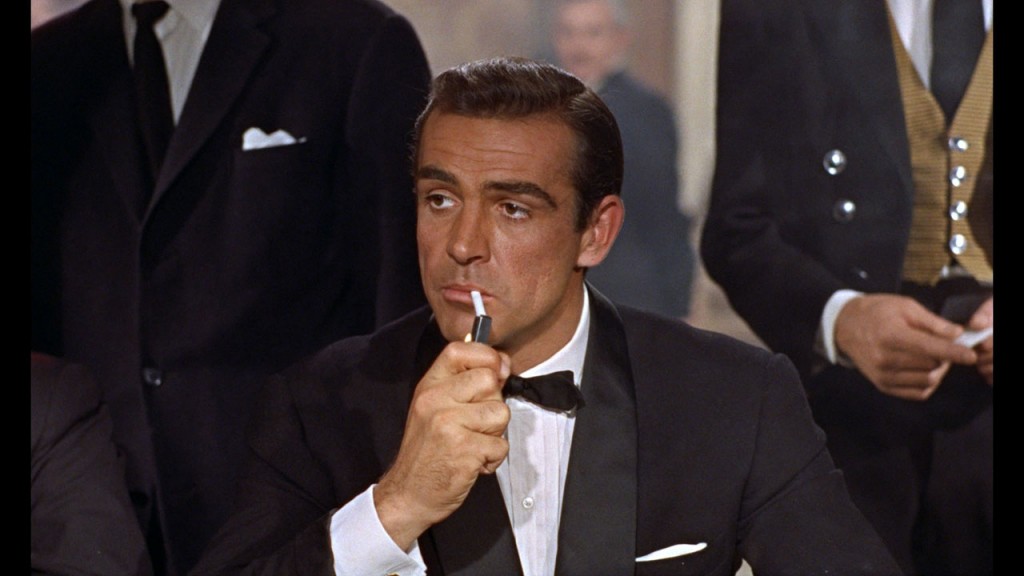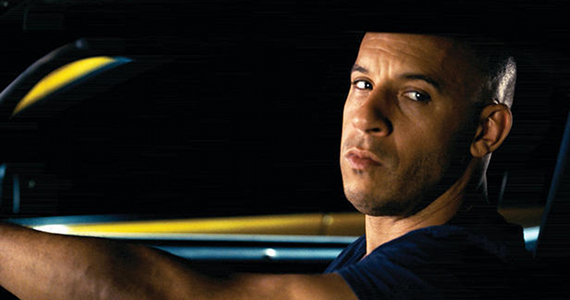some thoughts on Rogue One: The Gang
The question that Rogue One poses is “What does it mean to rebel?” Why rebel against authority? Should one rebel against all authority? What does rebellion do to one’s soul? What does conformity do to one’s soul? Why rebel when rebellion will lead to the deaths of millions, and maybe the death of you? Star Wars movies, up ’til now, have always explored the question of Empire vs Rebellion in stark black-and-white terms, but Rogue One dices up those terms, folds them over and then dices them up again before arriving at a conclusion.
some thoughts on Rogue One: Director Krennic
Before we discuss Director Krennic, let’s take a look back at the previous “bad guys” from the Star Wars universe:
First and foremost there is Darth Vader. Darth Vader starts off as “evil” in Episode IV, develops into “evil, but subservient to a greater evil” in Episode V, and, finally, “evil, but conflicted, and eventually redeemed” in Episode VI. Vader’s Terminator-like consistency was part of his appeal, it was what made him terrifying. He wore a mask, you couldn’t know what he was thinking, he destroyed anything that got in his way.
Then there is Emperor Palpatine. Emperor Palpatine is an uncomplicated climber, a man whose pursuit of power didn’t corrupt him at all, because he was evil to begin with. He started out a villainous creep and ended up as, apparently, all Sith Lords end up: killed by his own apprentice.
Then there are garden-variety bad guys like Grand Moff Tarkin, Jabba the Hutt, General Grievous and Nute Gunray, who range from sniveling pawns to grotesque monsters.
What all of them have in common is “they are bad.” In story meetings, when the producer asks “What is the antagonist’s motive?” the poor screenwriter says “He does bad things because he is bad.” That, of course, is how you know you’re writing a melodrama.
(The word “melodrama,” for non-theater-nerds, comes from the theater of early America, where people of many different linguistic backgrounds would all go to the theater to enjoy a play. Because not everyone spoke the language being used on stage, the band in the pit would cue the audience as to how to feel about different characters. A “sweet” character would be given a sweet melody, a “sinister” character would be given a sinister melody, a hero would be given a heroic melody, and so forth. Hence, “melodrama,” a dramatic form where the audience is heavily cued as to the “good and bad” of the narrative. John Williams’s music for the earlier movies used all these tricks to good effect: Luke got a yearning theme, Leia got a gentle theme, Darth Vader got an imperial march.)
The problem with this approach, of course, is that no bad guy ever thinks of himself as “the bad guy.” As Jean Renoir said, “everyone has their reasons.”
Things have improved with the re-launch of the brand and Episode VII. Kylo Ren is a genuine freak, a perverse, warped individual who is compelled to do bad things even when he doesn’t want to, who wears a mask when he doesn’t need to, who reacts with fear and confusion when his worldview is challenged.
And now we have Director Krennic, the most finely-drawn, complex villain we’ve seen yet.
some thoughts on Rogue One: Galen Erso
Of all the characters in Rogue One, Galen Erso has the most complicated motivations, which I will discuss inside.
some thoughts on Rogue One
Another Star Wars movie is released, and so the time has come for all denizens of the internet to remind the world that they would make a better Star Wars movie than anyone in Hollywood. I’ve been told that Rogue One is both too radical a departure and more of the same, that it’s both too grim and too superfluous, that its plot is both too complicated and too simple, that the story is both too esoteric and too obvious. These are the kinds of complaints that, to my mind, can only be the product of expectations. If one goes into a movie with a set of expectations and those expectations are unfulfilled, sometimes one’s response is to spend the running time looking for the movie expected instead of watching the one being screened.
But of all the complaints directed at Rogue One, the oddest one I’ve found is “the characters are thin.” This is absurd, since the characters in Rogue One are, by a long stretch, the most complex ever presented in a Star Wars movie. Generally speaking, the characters in a typical Star Wars movie are “one thing.” Obi-Wan Kenobi is “wise,” Luke Skywalker is “idealistic,” Leia is “spunky,” C-3PO is “fussy.” In 1977, Han Solo emerged as the breakout character of the series because he’s the only one who changes: he starts out as a murderous mercenary and slowly turns into a radicalized rebel. Darth Vader only becomes interesting as a character when we see him, in the original trilogy, go from being “pure evil” to being an individual caught between conflicting emotional impulses. The prequel trilogy squanders the opportunity to make Vader’s character more interesting by placing him on a straight road from “jerky kid” to “jerky teenager” to “jerky adult” before arriving finally at “victim.” The prequels are boring not because they lack plot but because Anakin Skywalker never changes. The key moment of his character arrives at the end of Episode III, when the Darth Vader mask is lowered onto his face, sealing his identity, and his destiny.
Speaking of masks and identity, the characters of Rogue One stand out in the Star Wars universe because, unlike most others, they are one thing, but they yearn to be another thing, while circumstances insist on them being a third thing. Identity is a strong theme running through Rogue One, identity and how it functions in society. One presumably knows who oneself is, but society often demands that one pretend to be someone one is not, to play a role. This happens to everyone to one extent or another, because social order otherwise disintegrates. Like Darth Vader, we all must wear masks as we play the roles of student, of employee, of spouse, of parent, of citizen. The conflicts in Rogue One emerge when characters get tired of playing their assigned roles, when they insist on expressing themselves, revealing who they “really are.”
As discussion of the Rogue One characters necessarily involves spoilers, be warned!
Some thoughts on Carrie Fisher
Certain corners of the internet are rumpled with consternation over Carrie Fisher’s appearance in The Force Awakens. Specifically, people want her to shut up about having to lose weight to play the role of General Leia. I don’t generally concern myself with celebrity gossip, but this particular teapot-tempest has caught my attention.
Here’s the story as I understand it: Disney asked Fisher to lose 35 lbs in order to play Leia. Fisher, being past 50, had difficulty losing the weight. As anyone past 50 would. She has mentioned it in interviews, and on social media. With great grace and humor, because she is, in addition to everything else, a hell of a witty gal. She was under pressure to lose weight, as any aging actress — strike that, any aging woman — oh hell, any woman — is, and her current profile of “being in a new Star Wars movie” makes her struggle news. Who would not want to hear about an aging actress’s struggle to reclaim her signature role? I want to hear about it. The story has “human interest” written all over it. Everyone over 50, and anyone who plans to live past 50, has an interest in hearing about her struggle. And, while she says that Disney asked her to lose the weight, nowhere does she say that they were out of line to do so. She’s Hollywood royalty, she knows the score probably more than anyone alive.
Some thoughts on Star Wars: The Force Awakens: Poe Dameron and General Hux
Tale as old as time: the younger generation repeats the actions of the older generation. Each generation thinks they invented the world, but, always, there is precedent.
When A New Hope came out in 1977, its success was driven by teens but it was also a perfect family picture — adults could get lost in the nostalgia for old-timey serials, and perhaps admire the classically-hand-tooled-leather-bound storytelling, while children and teenagers could be simply thrilled and amazed as they never had been in a movie theater before. It was the Beatles of my generation, the one thing everyone agreed on.
I had never seen a Flash Gordon serial in my life, as there was no Youtube at the time, so the vision of George Lucas was a searingly brand new thing for me. I didn’t know that he’d lifted things from Flash Gordon (and many other sources), from the title crawl to the names of his characters. Nor would it have mattered to me if I did. Clearly, clearly, Lucas had added something to his endless references. Kurosawa could immediately see that Sergio Leone had stolen A Fistful of Dollars from Yojimbo, but I’m guessing he’d be hard-pressed to identify the elements George Lucas stole from The Hidden Fortress, although he would have recognized his beloved screen wipes.
Today, The Force Awakens repeats the feat of A New Hope, with a twist: children are amazed and moved by the stories of Rey and Finn, and everyone else gets lost in the nostalgia, but instead of nostalgia for other movies, it’s nostalgia for Star Wars itself. The defining feature of George Lucas’s generation of filmmakers (Spielberg, Scorsese, De Palma, Landis, Dante, Miller) was that they were the first generation of film-school directors: their movies were about other movies. Now, a generation later, filmmakers like JJ Abrams grew up on the movies of Lucas’s generation, and make movies about movies, about movies. My father was shocked at Jaws, not because of the violence in it, but because the kid who directed the movie ripped off Hitchcock at every turn and didn’t even break a sweat to do it. He took Hitchcock for granted. Now, that level of tossed-off cinematic reference is simply a part of the typical movie-going experience. In The Force Awakens, the Star Wars narrative, having launched a generation of imitators, has nothing to refer to but itself. What thirty-year-old genre could a new Star Wars movie refer to at this point?
A New Hope (God, I still hate that title) starred a cast of complete unknowns, with one special elderly guest star brought in to lend some gravitas to the proceedings. The Force Awakens repeats that trick, too, but in this case the elderly guest star is Harrison Ford, and he very much plays the Obi-Wan role, narratively speaking. The other actors are largely unknown, with the exception of Oscar Isaac, who plays Poe Dameron. Isaac, if you haven’t seen Inside Llewen Davis, A Most Violent Year or Ex Machina, is an incredibly serious capital-A Actor, the kind who, 30 years ago, wouldn’t have been caught dead in a Star Wars movie. If you can imagine Al Pacino playing a minor role in A New Hope, maybe Jabba the Hutt, with his tail being tread upon by Han Solo, that’s the level of incongruity at work here. (Not to mention Max von Sydow — Max von Sydow! — showing up briefly.)
That’s another symptom of our current generation of filmmakers. A Star Wars movie, or a Marvel movie, or a Harry Potter movie, or a Hunger Games movie, is no longer considered an embarrassment on your resume, something you did “for the money,” like Max von Sydow doing Flash Gordon (as we come full circle). It’s a badge of honor, a sign you’ve “made it.” “Serious” filmmaking used to be done in the realm of drama, and Star Wars was science fiction, a gutter genre. All that has changed now, all the serious money, and serious talent, is drawn not only to genre pictures, but juvenilia, and “serious drama” is all on television now. And Star Wars is the engine that drove that change.
But, to the question at hand: What does Poe Dameron want? Spoilers within!
some thoughts on Star Wars: The Force Awakens: Finn
Some folks on the internet find a cynical motive behind The Force Awakens‘s re-use of plot points from A New Hope. They see it as a corporation playing it safe, pandering to the audience, protecting their considerable investment. And yet, if “playing it safe” was the order of the day on the production of The Force Awakens, why are the four principle “good guys” of the movie played by a woman, a black man, a Guatemalan and a 73-year-old Jew? That sounds like idle snark, but let me assure you, movie studios are the most risk-averse institutions on the planet. I was once asked to develop a science-fiction franchise, based on a series of novels about a teenage girl trying to negotiate her way through a futuristic dystopia obsessed with beauty, and I outlined an entire trilogy, which took two and a half hours to pitch, only to have the female executive ask me if I could make the protagonist a boy. That was before The Hunger Games, of course, so now it would theoretically be “okay” to recognize that girls like science-fiction too, but to have a female protagonist with a black co-lead, and to have her kiss him in Act III? For the studio who refused to market Black Widow toys in connection with its Avengers movies, because “Disney has the girl market locked up with princess movies, thanks?” This is, I guarantee you, a bold step forward.
But, more germane to our discussion here, what does Finn want?
some thoughts on Star Wars: The Force Awakens: Kylo Ren
The true protagonist of The Force Awakens is Kylo Ren. He sets the narrative in motion and drives the action, and, in fact, “changes” the most. He also functions as the antagonist of pretty much everybody else in the movie. This kind of protagonist, once a staple of cinematic drama, is more properly called an anti-hero. An anti-hero is a protagonist who is on the opposite of a hero’s journey, a person who is bent on self-destruction. Nicolas Cage in Leaving Las Vegas comes to mind. Robert De Niro in Taxi Driver, or any of his major roles, really, is a classic example. And, of course, Darth Vader in the prequel trilogy.
More after the jump. Please don’t get your spoilers spoiled! Read more
some thoughts on Star Wars: The Force Awakens Rey
It seems hard to believe that everyone in the world hasn’t already seen this movie, but, just in case, please be advised that there are spoilers ahead.
Some thoughts on Furious 7
In 1962, Sean Connery starred as James Bond in Dr. No. This was not the first appearance of James Bond. The character had been around for nine years before that, in the novels by Ian Fleming of course, but had also showed up in both a TV adaptation and, of all things, a newspaper comic. But after Dr. No, Bond was everywhere. Connery’s performance lodged in people’s minds and by the time Goldfinger came out the character had become an immortal icon, a symbol.
But a symbol of what? As a child, I had no idea what the heck James Bond was “about.” The movies seemed to drag. They weren’t thrillers or dramas, they were light-comic pageants, devoid of suspense or surprise. Nothing of import seemed to happen in them. It wasn’t until later that I identified James Bond as a symptom of cold-war “lifestyle marketing,” related more closely to Playboy and Esquire than the espionage thrillers they purported to be. Bond was a hollow man, a collection of attitudes. A tuxedo, a gun, cool toys and a limitless supply of ladies.
